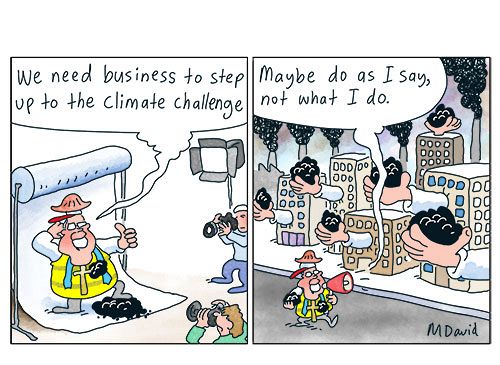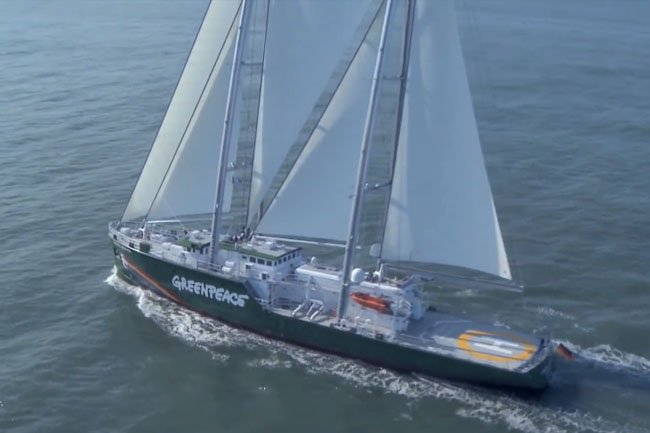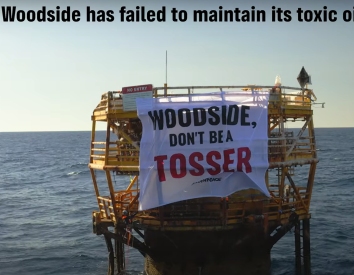Toyota has been identified as a major roadblock to electric vehicle transition, delaying climate action by refusing to set phase-out dates for fossil fuel engines, writes David Ritter.
WHEN WE think of the world’s most damaging anti-climate lobbyists, some obvious names spring to mind. ExxonMobil, Shell, Woodside and their oil, coal and gas cohort are well known for pushing their own dangerous fossil fuel interests. But there’s another major player whose work behind the scenes is delaying climate progress that may surprise you: automaker Toyota.
Toyota has been identified as a major roadblock to the electric vehicle transition worldwide. According to independent think tank InfluenceMap, Toyota is now ranked as the world’s third most negatively influential global company on Paris Agreement-aligned climate policy, behind the two oil giants Exxon Mobil and Chevron.
It is easy to guess the vested interest that Toyota is trying to protect. Greenpeace recently ranked the world’s ten biggest car manufacturers on their decarbonisation plans and actions. And for the second year in a row, Toyota is ranked dead last — not only because of its aggressive lobbying but also because it refuses to set phase-out dates for fossil fuel engines and meagre battery electric vehicle sales.
Toyota dominates the Australian auto market. It has topped the sales charts for 25 years and is widely trusted. But, the company has coasted for years on an “environmentally friendly” reputation based on now-outdated hybrid technology.
In the 1990s, Toyota launched the Prius as the world’s first mass-produced hybrid. It soon became an icon of eco-conscious consumerism. Meanwhile, Toyota continued to also produce millions of petrol-guzzling models.
When Toyota began selling the Prius in 1997, the company truly was a clean car leader and its hybrid technology was cutting edge. But the pace of change in the automotive industry has accelerated rapidly since the 1990s and Toyota has fallen behind.
One-quarter of a century later, hybrid vehicles are about as cutting edge as CD players. In 2022, we have cleaner, smarter, fully electric vehicle technology.
Having got ahead of the market with the fossil fuel-hybrid Prius, Toyota has fought against progress while continuing to make money from selling old-fashioned petrol-guzzling cars — and it’s doing massive damage to the planet and human health.
In 2021, 499 out of every 500 vehicles that Toyota sold were powered by fossil fuels. Zero-emission vehicles comprised just 0.18% of Toyota’s total sales last year, compared to 8.18% for General Motors. And that doesn’t look like changing anytime soon.
One analysis that compared automakers' global zero-emission strategies until 2029 found that Toyota is forecast to have the lowest percentage of zero-emissions fleet-wide global vehicle production in 2029 (14%) of all automakers analysed. Toyota was also discovered to have the most negative climate policy engagement.
In the last year alone, Toyota appears to have lobbied to weaken dirty vehicle phase-out policies in the EU, the UK and New Zealand. Toyota also refused to sign a global pledge made at the COP26 global climate talks to phase out dirty fossil fuel cars in leading markets by 2035 and globally by 2040.
But while Toyota works behind closed doors to slow changes that would threaten sales of its old-tech fossil fuel-powered hybrids, the company touts a public claim to carbon neutrality by 2050.
Australia is now at a crossroads in our transition to electric vehicles.
The Albanese Government is currently consulting with the industry on its review of fuel efficiency standards and Toyota will be a powerful voice. Notably, the CEO of Toyota Australia is also chairman of the peak body Federal Chamber of Automotive Industries (FCAI).
Fuel efficiency standards regulate the climate pollution produced by vehicles. Apart from Russia, Australia is the only nation in the Organisation for Economic Co-operation and Development (OECD) that doesn’t have these standards.
Appallingly, Australian fuel efficiency standards are among the weakest when it comes to developed economies. These shockingly lax standards mean that car manufacturers like Toyota can use Australia as a dumping ground for the polluting, inefficient cars that are no longer acceptable to much of the rest of the world.
When NZ undertook a similar process to introduce vehicle standards last year, Toyota appeared to advocate against the proposed 105-gram CO2 /kilometre emissions standard for light-duty vehicles, arguing for a significantly less stringent 130-gram CO2 /kilometre target. In the same year, Toyota opposed a 2035 phase-out date on new petrol and diesel car sales in New Zealand.
With Australia’s electric vehicle transformation long overdue, it is time for Toyota to put aside any thought of blocking tactics and do the right thing by unreservedly supporting strong fuel efficiency standards in line with other major markets. And it must speed up the transition to electric vehicles.
David Ritter is the chief executive officer of Greenpeace Australia Pacific. You can follow David on Twitter @David_Ritter.
Related Articles
- Transitioning to electric vehicles — Australia is in for a shock
- Autonomous vehicle services: The future has a long and winding road
- What Australia can learn from electric vehicle policies in Indonesia
- The Coalition’s foolhardy war on electric cars
- Electric vehicles threaten oil but are a boon for health
 This work is licensed under a Creative Commons Attribution-NonCommercial-NoDerivs 3.0 Australia License
This work is licensed under a Creative Commons Attribution-NonCommercial-NoDerivs 3.0 Australia License
Support independent journalism Subscribe to IA.














